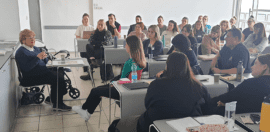LGBTI Pride in the Uniting Workforce
30 May 2016 at 10:38 am
Christian-based welfare provider Uniting has been named as the best Not for Profit employer of LGBTI people in Australia.
The aged care provider featured in the list of Australia’s Top 10 LGBTI-friendly employers at the 2016 Pride in Diversity Awards, ACON’s industry awards which recognise Australia’s most inclusive places to work.
It marks the second year in a row the aged care provider has been listed in the Top 20 Employers.
Peter Worland, executive director of Uniting, said he was humbled by the achievement.
“There is nothing more that we strive for each day than to ensure everyone feels free to live the life they choose,” Worland said.
“This year Uniting has celebrated some special achievements in partnership with the LGBTI communities, but we need to acknowledge there is still more to be done – receiving this award… will spur us on in our work and advocacy.”
Uniting is recognised independently both for its inclusiveness of services, through the Rainbow Tick, as well as through inclusiveness of workplace through Pride in Diversity Program, Australian Workplace Equality Index.
Dianne Latter, deputy service manager at Uniting Elizabeth Gates Aged Care in Singleton, said she was proud to work for an employer that embraced LGBTI people.
“When I came out I was 49 years old and I was working at another Christian organisation, and I was discriminated against. I left that organisation because of that discrimination so that was really difficult,” Latter told Pro Bono Australia News.
“But in the current workplace, I have certainly been embraced, welcomed with open arms, there has been no hint of discrimination from the organisation or the people I work with even, which has been really wonderful. Certainly I have experienced that discrimination elsewhere.
“When you feel comfortable in your own skin and you feel at work that you are supported and encouraged and nurtured, I think it is easier to go out from work and be yourself, and be able to talk to people about your sexuality. There is no conflict in your own life, which is really a wonderful thing. Having felt the conflict for so many years, the way I feel now is so amazing. I think the workplace has definitely helped that.”
Latter said education was key to an inclusive workforce.
“I think education has been the number one important thing that Uniting has done very well,” she said.
“It’s been a really concerted effort to educate all staff and also the residents as well, we’ve involved them in that.
“I think it is just a gradual [process of] making people aware, educating them, just making them realise that LGBTI people are not a threat to them. I think gradually over time, when marriage equality happens, then people will feel it is not going to affect them… I think the things we are doing, the awards that we got… and the Rainbow Tick, and attending the mardi gras and being out there in the community showing support for LGBTI, I think it is just by example, it is going to be helping other people to think, ‘Oh ok, if they can do it well maybe we can take that on board to.’”
Latter said she looks forward to the day when an inclusive workforce becomes the norm.
“That would be just wonderful,” she said.
“I think once marriage equality happens, I think that it is going to be closer, I think it is probably a couple of years off yet, but I think when that happens that will be a big turning point, that will be part of the norm. It will be nice to just not be a diverse group but be people just like hetrosexuals.”
Steve Teulan, director of ageing for Uniting, said some organisations did not know how to be inclusive but said he would encourage other organisations to follow their lead.
“Many organisations want to be inclusive but they just don’t know what steps to take. That’s what we do, we encourage them and show them how it can be done,” Teulan told Pro Bono Australia News.
“Another thing is, for some organisations they haven’t built the relationships with the LGBTI organisations, so we have great relationships with organisations like ACON and Gender Centre, and when you hear the stories that people have experienced of discrimination and abuse or isolation, exclusion, you can’t help but feel as though you have to do something.
“So I think there are two things, people haven’t actually spent the time to build the relationships and listen to the stories, because when you hear them you are moved. The other thing, is even if they do want to do that, sometimes with all good intent, they actually don’t know where to start. Many come to us and say ‘what steps should I take first’ and that’s where we help them.
“I think the best thing they can do is to start by contacting organisations who will help them, so Pride in Diversity in relation to workplace inclusion, where someone actually will sit down and take them through a process of what it means, the practical steps you can take. They will also help them to actually understand the stories, the experiences that people have when workplaces aren’t inclusive and the impact it has when they are.”
Teulan said he didn’t think organisations could afford not to be inclusive.
“For Uniting, the importance is that it really aligns so beautifully with our values. The values of the Uniting Church, are the inherent dignity of each person, a passionate commitment to social justice and the celebration – not the acceptance or tolerance but celebration – of diversity. They’re sort of core values that are embedded in us, so for us it is the perfect thing to do, to create welcoming and inclusive communities,” he said.
“So that has a special significance for Uniting, but for all organisations I think they create healthier, more creative and happier workplaces, they are places where people feel as though they can be themselves and that is fundamentally important.
“Many people don’t realise the benefits of inclusion. We have people coming to us because we are inclusive. People want to join us, staff, volunteers, we have clients who want to come to us because we are inclusive.
“We had three objectives when we started this process; first of all we wanted to work on becoming an inclusive aged care and social services organisation, the second objective was to influence the social services sector so that other organisations would also become inclusive, and our view in that was that within 10 years there would be truly an inclusive social service sector and we think that that will happen, and our third objective was to influence society in our own small way to actually demonstrate the value of inclusion, and our expectation is that within the next decade we will see at both at a service level and at a workplace level, genuine inclusion, as we don’t think organisations can afford not to be inclusive.”








One of the greatest Biblical truths is in Romans 1:16-32. No honest person can disagree with the passage because it is being fulfilled before our very eyes (for example: “Professing themselves to be wise, they became fools”, “vain in their imaginations, and their foolish heart was darkened”, “uncleanness through the lusts of their own hearts”, “God gave them up unto vile affections”….and verses 28-31 describes most of our politicians perfectly). There is plenty in the passage that talks about “dishonour(ing) their own bodies between themselves” and “for even their women did change the natural use into that which is against nature: And likewise also the men, leaving the natural use of the woman, burned in their lust one toward another; men with men working that which is unseemly”…..hmmm….it’s not hard to work out what it says.